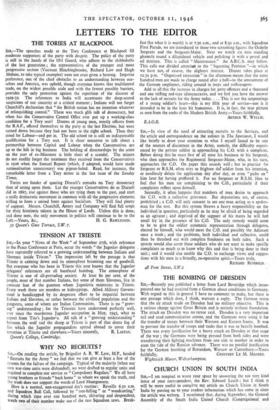Snt,—In view of the need of attracting recruits to the
Services, and the article and correspondence on the subject in The Spectator, I would like briefly to draw your attention to what I myself found to be one of the sources of discontent in the Army, namely, the difficulty experi- enced by the private soldier in approaching his CO. with a complaint, Before doing this he must first of all state his business to his Sergeant, who then approaches the Regimental Sergeant-Major, who, in his turn, approaches the C.O. On paper this sounds well ; but in practice the Sergeant or R.S.M. often tries to frighten the soldier from his intention, or needlessly delays the application day after day, or even "picks on" him later for having proffered it. For no Sergeant or R.S.M. likes to feel that his men are complaining to the C.O., particularly if their complaints reflect upon himself.
Secondly; it often happens that numbers of men desire to approach the C.O. with a collective grievance. But deputations are, of course, prohibited ; a C.O. will only consent to see one man acting as a spokes- man for the rest. But this system throws a heavy responsibility on the individual in question, particularly as he may be afraid of being regarded as an agitator ; and deprived of the support of his mates he will feel small fry in the presence of his C.O. The only remedy would seem to be to give the soldier automatic representation through delegates, elected by himself, who would meet the C.O. and possibly the Adjutant once a week ; and the problems, both individual and collective, could then be thrashed out with complete frankness on both sides. Such a system would also cover those soldiers who do not want to make specific complaints so much as to know why this and that is being done in their unit ; and it would also enable the C.O. to exchange views and sugges- tions with his men in a friendly, co-operative spirit.—Yours truly,






























 Previous page
Previous page